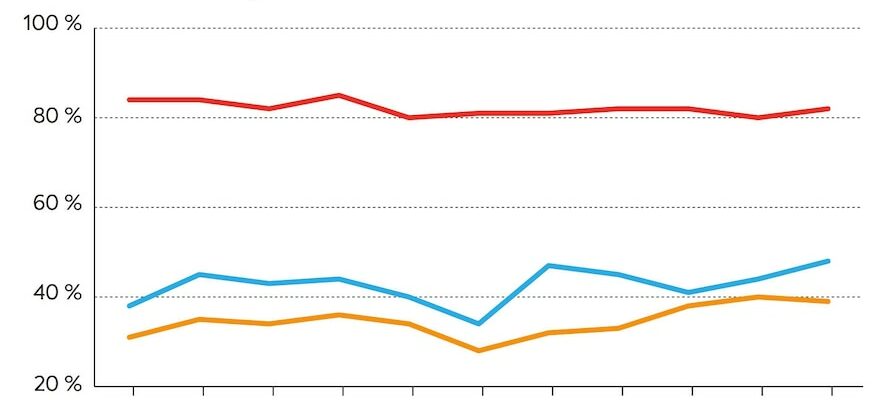Some plates are made of hardened steel. The French would be hostile to the market economy, viscerally attached to an obese State, resistant to the entrepreneurial spirit, stuck in a cushy conformism where success is necessarily subject to suspicion… And if we had to definitively throw it away these old moons? In the midst of a storm, the country is looking above all for a compass and a captain. In recent times, the business leader increasingly embodies the protective figure in the face of chaos. As for societies, they appear as an anchor thanks to which the need for projection into the future can – in part – be satisfied.
The latest delivery of the Ipsos survey, carried out in partnership with Cevipof, the Jean-Jaurès foundation and the Montaigne Institute, confirms this trend. Certainly, in France, where “small” is always valued – we love the little restaurant, the little film, the little wine, etc. – SMEs have long been popular: 82% of respondents trust them. A new development is that big business, although associated with dangerous globalization, is increasingly popular: 48% of French people say they have confidence in big companies, a level never reached in this survey. A enthusiasm much higher than that shown to unions (38%), the media (23%), deputies (22%) or political parties (only 14%).
Percentage of respondents who responded that they had confidence in different organizations
© / THE EXPRESS
The place of the concrete
“In a society where distrust is widespread towards everything that is linked to politics, the company remains the place where things are held”, deciphers Brice Teinturier, the deputy general manager of Ipsos. Paradoxically, the Covid shock precipitated this shift in public opinion. The country’s activity was put under lockdown by the will of the public authorities, but the “economic body” resisted. Logistics chains worked, supermarkets remained open thanks to the “front lines” and companies scrambled to provide masks to their employees. Certainly, with partial unemployment, guaranteed loans and multiple aids, the State has played its role. But the “whatever it costs”, which has weighed down the accounts, has almost been trivialized, as public speech has been discredited. “The more politics fails, the more public deficits are adrift, and the more business appears as the concrete place where we create wealth and weave social relations,” notes political scientist Chloé Morin.
No question of falling into angelism. Black sheep exist and the decline in conflict in the company remains precarious. “But no big company boss can afford today what politicians use and abuse, that is to say lies, approximations, easy shortcuts,” notes a communications pundit and specialist. crisis management. Companies are constantly under the scrutiny of the citizen-consumer, and of the financial markets for those that are listed. This risk of seeing one’s reputation tarnished is monitored like milk on a fire, while a swipe of the contract of trust can bring down an entire business. And then “CSR”, social and environmental responsibility, a vague concept ten years ago, is now at the heart of all strategies. It sometimes results in more or less bogus actions. But here again, the standards and requirements of financial investors force companies to move, thus responding to the wishes of public opinion, consumers and employees.
A community of destinies
While shortages of qualified labor affect many sectors, there is finally the need to respond to employees’ demands in terms of well-being at work. For fear of seeing them leave for more welcoming skies. “The company remains one of the only communities of destiny in which individuals of different origins, identities and social classes meet and participate together in the achievement of a common long-term objective”, wants to believe Patricia Barbizet, the general director of Afep, the powerful lobby of big businesses.
After the “nanny state”, here is the “bulwark company”. Be careful, however, not to go too far. “The risk for companies that have become ‘citizens’ is to see themselves embroiled in political debates that go beyond them,” points out Chloé Morin. Or to be caught up in a sudden turnaround in the economy, forcing them into a wave of layoffs with disastrous consequences for confidence. After all, out of sight, out of mind.
.
